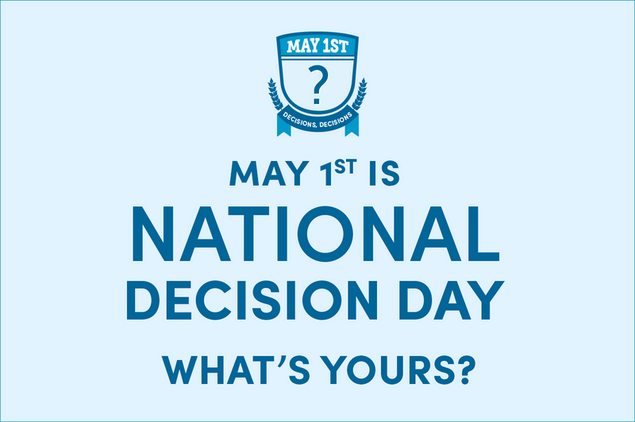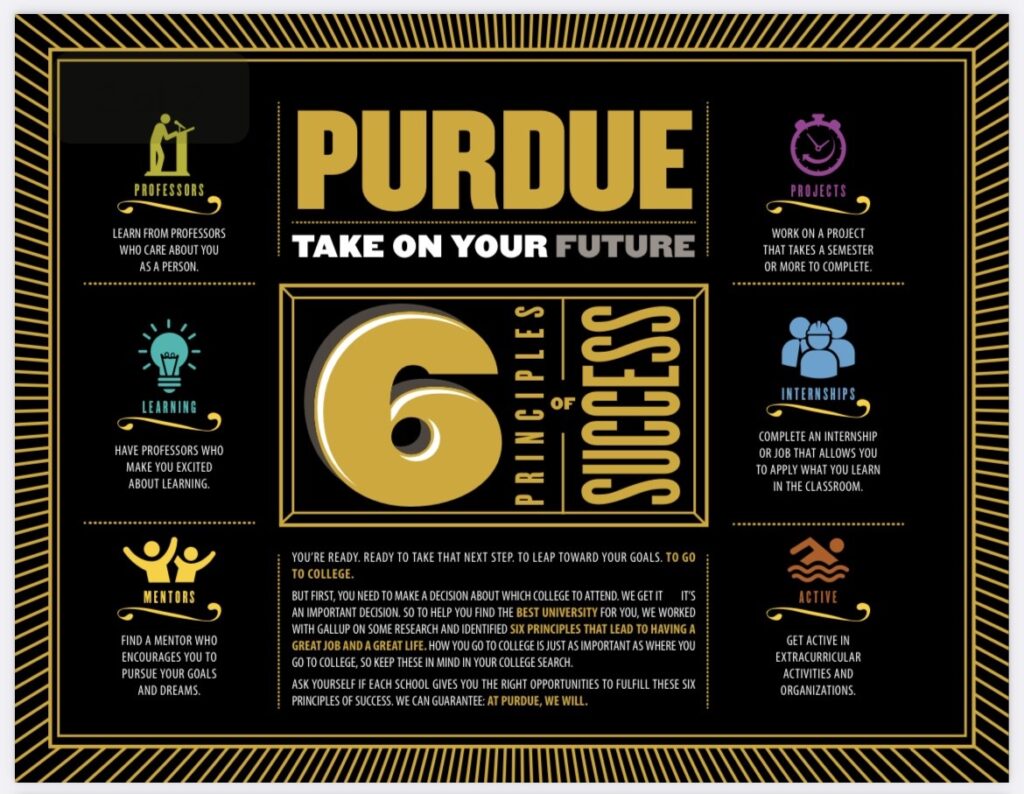College enrollment decision day approaches
April 27th, 2021May 1st has long been considered “National College Decision Day.” While some colleges have decided to extend their enrollment deadline, for many colleges this still marks the final day for accepted students to declare their enrollment intention for the upcoming year.

Many Shrop Ed advisees have already determined their enrollment choice. But for those still on the fence, this post is for you! Try to reset your thought process by considering what success means to you in the simplest of terms. Purdue University shares an excellent way of framing this concept in their article, “Six Principles of Success,” by Gallup. Take a moment to review and, as you consider the pros and cons of each of your options, ask yourself what opportunities each college is offering that will satisfy the pillars of success as YOU define them.

2021-2022 Common Application essay topics
April 13th, 2021As high school seniors work their way toward thoughtful enrollment decisions this month, juniors are putting their all into making spring term as successful as possible. While we don’t want to shift juniors’ attention from school obligations, we thought a peek at Common Application essay topics might provide a fun outlet for creative thinking.

The Common App just announced its essay prompts for the 2021-2022 application year and there is only one change: the replacement of one less popular choice with this new prompt, which we love.
Reflect on something that someone has done for you that has made you happy or thankful in a surprising way. How has this gratitude affected or motivated you?
Essays allow a unique opportunity for colleges to learn more about their applicants. Think of the essay as an opportunity to tell your story, to be open and authentic and let your true qualities shine through.
With summer right around the corner, now is the perfect time for juniors to begin the brainstorming process, whether for this new prompt or one of the others. Trust us, you want to get ahead of that demanding senior schedule!
Article referenced below from The Common App, published February 16, 2021 by Scott Anderson
2021-2022 Common App Essay Prompts
The Common App essay prompts will remain the same for 2021-2022 with one exception. We will retire the seldom used option about solving a problem and replace it with the following:
Reflect on something that someone has done for you that has made you happy or thankful in a surprising way. How has this gratitude affected or motivated you?
We will also retain the optional COVID-19 question within the Additional Information section.
The new prompt is inspired by scientific research on gratitude and kindness, specifically the benefits of writing about the positive influence of other people in our lives.
This mindset resonates with Common App President & CEO Jenny Rickard. “Particularly at this challenging time, we can help students think about something positive and heartfelt in their lives,” she explains. “And we can do it explicitly.”
First-year files: Understanding the gap year
March 30th, 2021Today’s first-year files entry has a different flavor! Although our writer graduated from high school and was accepted to University of Chicago last spring, she opted for a gap year and deferred her enrollment to fall of 2021. So instead of discussing her first year at college in today’s blog post, Jenny shares wonderful notes on the time she’s had for self-reflection and independent pursuit of several interests before diving back into intense academia in the fall.

If you’re thinking about a gap year, be aware that each college has its own guidance for gap year requests, so this is not one size fits all. Once approved, typically gap year students do not need to check in with their admissions officer to report their progress throughout the year but they do need to respond to enrollment requirements such as tuition payments, registration for courses for their planned entry term, etc. upon the college’s request.
What you’ll learn from this Q&A is that gap years should have structure and purpose, and they offer opportunity for significant growth. We are grateful for the heartfelt information Jenny shared with us and we wish her continued success, health and happiness. We know her post will help students who are at a crossroads trying to make a decision.
Q&A about choosing a gap year
Q: Why did you decide to take a gap year?
A: My biggest motivation for taking a gap year was to slow down for a year. If you’re familiar with Eisenhower’s Urgent/Important matrix, I felt like my entire high school existence was defined by constantly doing Urgent-and-Important work––––there was always a paper to write, a test to prepare for, extracurriculars to participate in, and before I knew it, college application season rolled around. I signed myself up for too many things, and as a result didn’t spend any time doing the Important-but-not-Urgent work––––things like “getting enough sleep” or “figuring out what I want to do with my life,” which are just as vital as papers, tests, and extracurriculars but don’t have immediate consequences when I pushed them aside. I wanted to take a gap year to slow down and make space for the Important-but-not-Urgent work, specifically building healthy living habits and self-reflection.
Q: What have you learned about yourself through the experience?
A: Now that I’m more than halfway through my gap year, I would say that its benefits are almost exactly as I expected: having the space to do the Important-but-not-Urgent things. I now maintain a healthy sleep schedule, exercise regularly, and enjoy spending time with my family. I got to know myself better, became more aware of my emotions, and thought about what I want out of my life. I also did some work––––part-time work in English tutoring and translating, running a product development project with my friends, and self-studying Spivak’s Calculus and a few psychology textbooks.
Q: What were the steps taken for approval by U Chicago?
A: Applying for gap year was simple for me. I emailed my regional admission officer with my gap year request and a proposal, and they replied two weeks later with an approval. The exact application process likely differs from school to school, but I expect what they need from the student to be the same: a clear purpose and action plan to ensure that your gap year application is a well-thought-out decision.
Q: Have you missed being in the classroom? And how might you approach your studies differently upon return?
A: What I miss the most from being at school is the structure. The biggest challenge I faced throughout the gap year is maintaining consistent motivation and productivity. At school, if you watch Netflix all day instead of doing work and wake up at noon, you will face consequences. During a gap year, however, you are the only one holding yourself accountable. I would say I had great work ethics throughout high school, but the lack of an external structure throughout the gap year blunted my productivity and focus much more than I expected.
The silver lining of this is the goals I pursue now are chosen more purposefully. At school, it’s easy to strive for good grades for the sake of getting good grades or do extracurriculars for the sake of doing extracurriculars without ever questioning the value of good grades or extracurriculars in the first place. During the gap year, with its lack of external structure, I get to think about work in terms of “what I want to do” instead of “what the environment expects of me”. It allows me to align my actions with my own values instead of others’ definition of success, and I think that’s a mindset I’ll take with me with me when I return to school.
Q: Anything else that you think high school seniors might appreciate?
A: Who I think will benefit from a gap year: If you are highly-motivated, enjoy self-reflection and independent projects, but felt like you didn’t have the chance to do either during school, then I think you’ll benefit from a gap year. There are, of course, other good reasons to take a gap year, but I lack the relevant experience to speak to them.
Gap year planning tips:
- Have a realistic and clearly-prioritized gap year plan. Gap year will go by faster than you expected, so if you, like me, made an overly-ambitious plan, then towards the end of the year, you’ll have to choose between accomplishing several goals. Putting your gap year goals into tiers of priority will you help you decide which goals to sacrifice.
- Construct an external structure for yourself. Whether it’s holding an internship, joining study programs, or even just checking in with your friends every week about your work progress, having something other than yourself to hold you accountable will help you maintain productivity and focus.
Admission decisions tied to enrollment projections
March 16th, 2021“Yield,” quite simply, is the percentage of students who accept a college’s offer of admission. This year, colleges are especially sensitive to how their projections are tracking to this metric both because of the economic pressure on their institutional budgets and the disruption that we know is shaping applicant behaviors.

For seniors this information is significant, as colleges have been looking closely at your demonstrated interest and could put a lot of weight on points of digital interaction this year. With so many unknowns, common formulas colleges have used in the past may not be reliable, and new tools should be evaluated for efficacy.
According to Rick Clark at Georgia Tech, some colleges may be utilizing their wait-lists more extensively this year. In the article linked below, Clark walks us through how colleges are trying to predict yield in 2021 and offers advice on what to do as admission decisions begin rolling in.
Article referenced below from Georgia Tech, written by Rick Clark on February 25, 2021
Predicting Yield in 2021: Everyone Shorts It
“$10 says he shorts it.” Just one of the countless quotable lines in the must– watch classic, Oceans 11.
After assembling the perfect crew, stealing a massive explosive device, falsifying identities, and recreating identical vaults, the heist of three Las Vegas’ casinos comes down to the ability of Yen (Shaobo Qin) to pull off a 10-foot backflip and land squarely on top of a cabinet inside a heavily protected vault that contains $160 million.
As the other members of Danny Oceans’ team watch from their secure location, Frank (Bernie Mac), says, “$10 says he shorts it.” While several of the crew jumped in to not only take the bet but raise the stakes during the simulated heist in their workshop, when it comes down to the real thing, they quickly and nervously reply, “No bet.”


